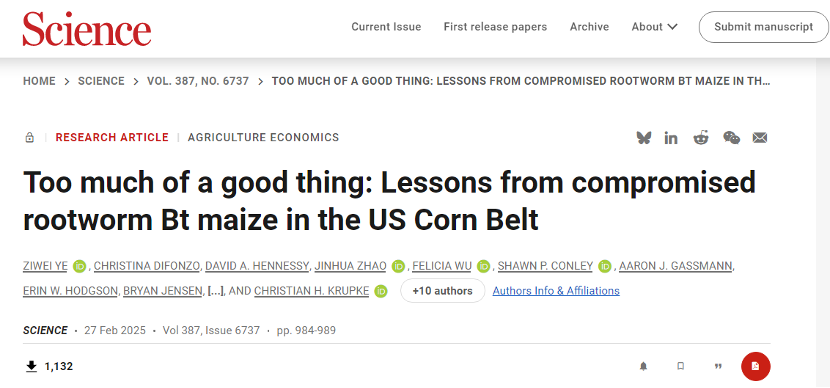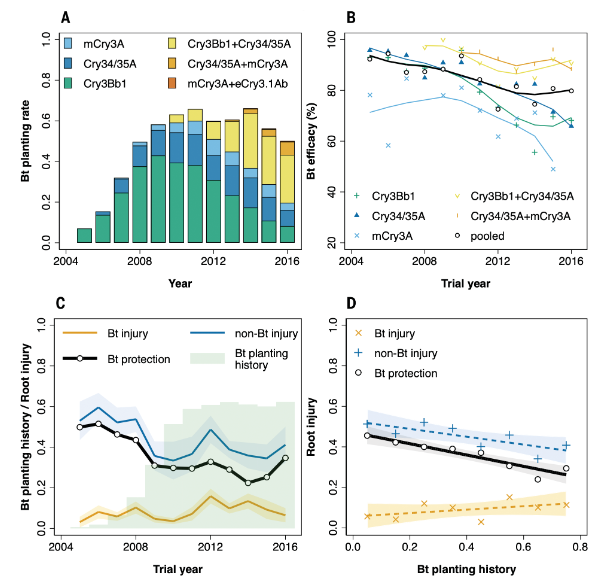
Ye Ziwei Research Team Publishes Groundbreaking Study in Science
Recently, a research collaboration led by Assistant Professor Ye Ziwei from the School of Agricultural Economics and Rural Development at Renmin University of China has published a landmark study entitled Too Much of a Good Thing: Lessons from Compromised Rootworm Bt Maize in the US Corn Belt as a Research Article in the latest issue of Science.

The Research Article section of Science primarily publishes research findings with significant breakthroughs in the field. This is the first Research Article published in Science by domestic scholars as the first author in the field of agricultural economics and management in China. It is also one of the few Research Articles in the field of management science published in Science.
Science published a commentary article in its Policy Forums section to discuss the study, stating that it “take an important step in improving empirical economic assessments of Bt resistance and pesticide resistance more generally”.
Solving the problem of resistance management in biotech crop industrialization by empirical economic evaluation
As an important part of new agricultural productivity, the application of biotech crops is crucial for ensuring food security and sustainable agriculture. In this context, effectively delaying resistance to biotech crops by target organisms has become a central issue. The Bt corn hybrids that resist the corn rootworms (hereinafter referred to as Bt-CR corn) has been commercially planted in the United States since 2003. While it has brought significant economic and environmental benefits, the issue of resistance to Bt-CR corn by the corn rootworm continues to challenge the academic community: from the perspective of balancing economic gains and delaying resistance, is individual farmer planting decisions the optimal choice?
Ye Ziwei's team combined field trial data from 10 states in the U.S. Corn Belt between 2005 and 2016 with farmer survey data to construct an interdisciplinary bioeconomic model, conducting the first large-scale empirical economic evaluation of Bt-CR corn resistance management.

The decision to plant Bt-CR corn may have two dynamic and counterbalancing effects on pest populations: resistance selection and population suppression. Therefore, whether Bt-CR corn is overplanted requires rigorous empirical research to determine, and corresponding policy measures should be formulated to optimize planting practices and delay the development of pest resistance.
Research has confirmed the overplanting phenomenon in the eastern corn belt of the United States and delved into its causes, further highlighting potential issues such as seed market supply. Under the oligopolistic market structure of the U.S. corn seed industry, companies tend to bundle the best varieties with multiple traits for maximum profit, while high-quality varieties without Bt-CR traits are relatively limited. This results in farmers having insufficient variety options, leading to overplanting. Not only does this accelerate pest resistance to Bt-CR traits, but it will also bring substantial economic losses in the long run.
The new generation of Chinese scholars is deeply engaged in interdisciplinary and cross-regional scientific research collaboration.
With the rapid development of crop biotechnology and its industrialization, how to delay pest resistance and maintain the efficacy has become a global issue. This issue extends far beyond the boundary of natural science research, encompassing economic, management and policy considerations.
Behind the Bt-CR maize study is a "meeting of minds" between entomologists and economists, as well as a cross-national and cross-regional scientific research collaboration.
During her doctoral studies at Michigan State University in the United States, Ye Ziwei began to focus on the economic, environmental, and policy issues of biotech corn. Initially, she focused on herbicide use for herbicide-tolerant corn. This research was published in 2021 in another top international journal —— Proceedings of the National Academy of Sciences of the United States (PNAS), from which she gained experience in interdisciplinary collaborative research.
After this research, Ye and Professor Christian Krupke of Purdue University's entomologists made contact and quickly began a collaborative study on Bt-CR corn.
Christian Krupke and other entomologists collected field monitoring data on corn rootworms, providing a natural science perspective on pest resistance ; Ye Ziwei, on the other hand, integrated agricultural economics, resource and environmental economics, insect ecology, and economic modeling to construct interdisciplinary bioeconomic models, thoroughly examining key factors such as resistance selection effects and population suppression effects.
"If you compare this research to a performance, the story of this insect-resistant corn is like a piece of music that has been written but no one has played it yet, until someone happens to sing and someone happens to play, and it turns out to be a wonderful performance."
In Ye Ziwei's opinion, this interdisciplinary and cross-regional cooperation proves that solving the "war" between human beings and nature requires not only scientific experiments in laboratories and fields, but also overall strategies of institutional design.
Author Profile
Ye Ziwei is currently an Assistant Professor at the School of Agricultural Economics and Rural Development, Renmin University of China, holding the “Young Talent” Position. She obtained her Ph.D. from Michigan State University (USA) in 2022 and joined Renmin University of China in the same year. Her research focuses on interdisciplinary issues at the intersection of agricultural innovations, resources and environment, and public health, with a particular emphasis on economic and environmental issues of biotech crops and related policy research. She has extensive experience in interdisciplinary collaborations. She has led and participated in multiple projects funded by the National Natural Science Foundation of China and ministerial/provincial-level commissioned studies.
Renmin University promotes organized research through major initiatives, interdisciplinary platforms, and collaborative networks, including its National Interdisciplinary Center for Smart Governance. University-level programs like the Young Scholars Incubation Fund, Interdisciplinary Research Teams, and Five-Pronged Youth Ecosystem (Talent Discovery, Exchange Platforms, Project Funding, Evaluation Systems, and Academic Promotion) foster emerging scholars.

